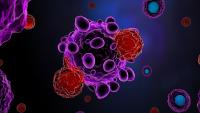Immunotherapy

What is immunotherapy?
Your immune system keeps you healthy by responding to foreign substances in your body. It finds and targets substances it doesn't recognize and then goes in for the attack.
But cancer is harder for your immune system to identify, in part because immune cells can't always tell the difference between cancer cells and healthy ones. And if your immune system doesn’t raise an alarm or doesn't attack the cancer cells aggressively enough, the cancer won't be weakened or destroyed.
Immunotherapy gives your immune system a boost—helping it find, target, and attack cancer cells more effectively.
How does immunotherapy work?
While there are many different types of immunotherapy, their approaches all follow or combine two important strategies:
- Make it easier for the immune system to identify and target cancer cells
- Strengthen the immune system's response to help it attack cancer cells more effectively
Types of immunotherapy
Adoptive cell therapy
The cells that your immune system naturally uses to fight against cancer are very powerful weapons—but only if they track down the cancer cells first. These immune cells, called T-cells, must be "activated" toward the specific cancer type in order to go on the attack. Adoptive cell therapy points these T-cells in the right direction by flipping that switch and increasing your body’s natural response.
T-cells are harvested from the patient and activated to fight the specific cancer needed. More of these enhanced T-cells are then grown in a lab. This way, a larger force of improved T-cells can be reintroduced back into the body to target the cancer cells for a sustained period of time.
Immunomodulators
Your immune system usually does a great job of measuring how strongly to respond to a foreign substance—but in the case of cancer, it sometimes needs some assistance. Immunomodulators help fine-tune when and how the body responds to cancer.
Treatment vaccines
Vaccines prompt your immune system to respond to a specific threat. Traditional vaccines use this response to prepare your body for an outside pathogen before it has a chance to cause problems. This approach can even be used to help prevent some types of cancer. For example, the human papillomavirus (HPV) vaccine can help protect against cervical cancer and other types of cancer caused by the virus.
Treatment vaccines are different in that they're used when the cancer is already present. In fact, material from the tumor site is commonly used as the basis of the vaccine. By using the very specific antigens and characteristics found in the tumor being treated, these vaccines help the immune system recognize and target that specific cancer.
Monoclonal antibodies
Some immunotherapy treatments mimic naturally occurring antibodies to provoke an immune response. Monoclonal antibodies are lab-made proteins that help T-cells recognize specific targets in cancer cells—once the T-cells can identify the cancer cells, they can mount a sustained attack.
What cancer types can immunotherapy treat?
Currently, not all cancers can be effectively treated with immunotherapy—and in many cases, immunotherapy is used in combination with other treatment options. But several promising new treatment options are being explored, and the field of immunotherapy is poised to greatly expand in the near future. Immunotherapy is typically offered as a treatment option for:
- Bladder cancer
- Brain cancer
- Breast cancer
- Cervical cancer
- Colorectal cancer
- Head and neck cancer
- Kidney cancer
- Leukemia
- Liver cancer
- Lung cancer
- Lymphoma
- Ovarian cancer
- Prostate cancer
- Skin cancer
What are the side effects of immunotherapy?
Immunotherapy puts your immune system into overdrive—and that strong immune response can cause strong side effects. When your immune system is working hard to attack cancer cells, the rest of your body will feel the impact. And while combining immunotherapy with other types of treatment can increase the benefits, it can also magnify the side effects. Immunotherapy affects different people in different ways, so side effects vary based on a number of factors, such as:
- Cancer type
- Overall health
- Cancer status
- Immunotherapy treatment type and dosage
Because immunotherapy treatment plans can take a long time to complete, it's important to discuss all of the potential side effects with your doctor so you can know what to do if they occur. Potential immunotherapy side effects include:
- Skin reactions at injection sites
- Flu-like symptoms (fever, chills, etc.)
- Headache
- Difficulty breathing
- High/low blood pressure
- Dizziness
- Diarrhea
- Nausea/vomiting
- Muscle or joint aches
- Fatigue
- Swelling/fluid retention
- Inflammation
- Increased risk of infection
Care at Columbia - choosing the right treatment for you
Immunotherapy is a highly focused form of treatment—and the more information we have, the better that focus can be. Knowing how to identify who is a good candidate for immunotherapy—not just because of the type of cancer they may have, but the specific genetic profile of their tumor—is key to making the right choice for care.
At Columbia Cancer, we're leading the way toward a better understanding of the genetic characteristics of specific tumor types—and applying that knowledge to help choose the right treatment for each patient.
Precision Oncology at Columbia
The Columbia Precision Oncology Initiative (CPOI) uses cutting-edge genetic sequencing and predictive computational models to help physicians understand each patient’s unique cancer. By identifying the genetic mutations of a specific tumor, our team can help determine which immunotherapy treatment can have the greatest success.
Learn more about The Columbia Precision Oncology Initiative
Columbia Cellular Immunotherapy Laboratory
Columbia University is one of the only U.S. institutions able to grow and manipulate T-cells for patients with cancer or severe infections. Our Columbia Cellular Immunotherapy Laboratory is a key center for innovation and research while also working to make immunotherapy treatments like CAR T-cell therapy significantly less costly and rapidly available to anyone in need.
Learn more about the Columbia Cellular Immunotherapy Laboratory
